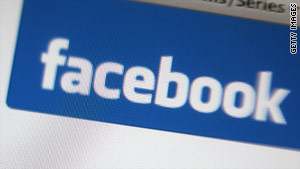News Of Facebook

(Mashable) -- Facebook launched its Send button Monday, in a bid to improve the functionality of Groups as well as replace the classic "email to a friend" button.
"Send" is intentionally similar, in look and feel, to the Like button. Click on Send and a pop-up appears, allowing you to send that article or page to friends, groups or any email address. You can then add a message and send the page to friends' inboxes or post it to a Group wall.
The button is designed to make it easier for users to share content with close groups of friends, Facebook product manager Austin Haugen explained to Mashable. He cited an increasingly popular trend: users posting a commerce site to a Group to figure out what gift to buy for a friend.
Another important detail: Send counts toward the total number of Likes a page has. The Like total is now calculated by adding the number of Likes, shares, comments and inbox messages containing a URL.
More than 50 websites are launching the Send button, including Gilt Groupe, 1-800-Flowers, The Wall Street Journal, Orbitz, Last.fm, The Huffington Post, People.com and The Washington Post.
The Send button's code is also now available on Facebook's Developer Website. And as with the Like button, it only takes a few lines of code to get the Send button running on a website.
If the implementations we've seen so far are any indication, Send will become Facebook's next Like button -- which celebrated its first birthday last week and is installed on more than 10,000 websites every week.
The Send button is designed to be Like's companion, focused on private sharing rather than public sharing features. And since Send includes the ability to share articles via email, the classic "email to a friend" functionality available on millions of websites is rendered obsolete.
Related post
WeBnews of google
(CNN) -- While search engines are busy crafting results pages to address our every whim, software engineers at Bing and Google have been peering at their competitors and crying foul.An executive for Bing, Microsoft's search engine, recently accused Google of stealing its ideas for designs and products. That followed an allegation by Google that Microsoft was monitoring Google search queries in an effort to copy its results pages.
This war of words comes as Bing appears to be eroding at least some of Google's dominant market share.
Google controlled 64% of the U.S. search market in March, down from 67% in February and almost 70% in December 2010, according to market research firm Experian Hitwise. Bing-powered search, which includes Yahoo!, rose to 30% of the market in March, up from 25.7% last December.
Google has added new search interfaces in the last couple of months that target specific categories. For example, a search for "chicken noodle soup" offers a recipes browser, and a query for "Dark Knight Rises release" places a "best guess" about the movie's opening date (it's July 20, 2012) at the top of the page.
These tools try to predict what information the user is searching for and give them an answer more quickly, without having to click through multiple pages.
That kind of methodology has been a priority for Bing since its inception, said Microsoft Search Director Stefan Weitz.
Bing launched in 2009 amid an advertising bonanza billing itself as "the decision engine." But refining search algorithms and competing with Google on how it ranks those "10 blue links ... is not where we're going to differentiate," Weitz told CNN. "That's not where we're going to win."
From the beginning, Bing tried to attack this area aggressively, Weitz said in a recent interview. The search engine would frequently jump to conclusions about what type of information the user intended to find.
But people were put off by Bing's audaciousness and by the drastic changes from what they were used to in a search-results page, Weitz said.
"We've had to kind of come back a bit," he said. "How do we not freak people out, but shift them to a model that's more helpful?"
So Microsoft has carefully segmented areas of interest, with recipes, restaurants, entertainment, shoes and other specialized browsing pages. Three-tenths of search queries return a page that has an "answer" at the top of it, Weitz said.
Google has caught on, he said.
"They see where the trend is going," Weitz said. "They launched recipe search, and that was a copy of ours. And then they launch 'video preview,' which is another copy of ours -- a poor copy."
Google spokespeople did not return requests for comment.
Google employees often argue about whether it's better to guess at what a user meant and risk getting it wrong, or to let the user take an extra step to decide, said Hartmut Neven, an engineering director for the search leader.
"Our philosophy is, of course, to get the user to what he wants to know or do with as few clicks as possible," Neven said. "Everybody and his mother has an opinion on what the perfect UI (user interface) is.
"It has as much to do with taste and personal preferences. Therefore, this will always remain a discussion. If you ask 10 people at Google, you will get likely varied opinions."
Neven couldn't resist the urge to take a shot at Bing's mobile application for searching pictures, which he said apes Google's Goggles app "but, of course, in a more limited fashion."
As for Google's accusation in February that Bing copies its results, Weitz dismissed the charge as an overreaction. To refine its search rankings, Microsoft monitors activity from volunteers surfing the broader Web, not just searching on Google, he said.
"We're academics," said Weitz, who has worked at Microsoft since 1996. "If plagiarism happens, you start to freak out."